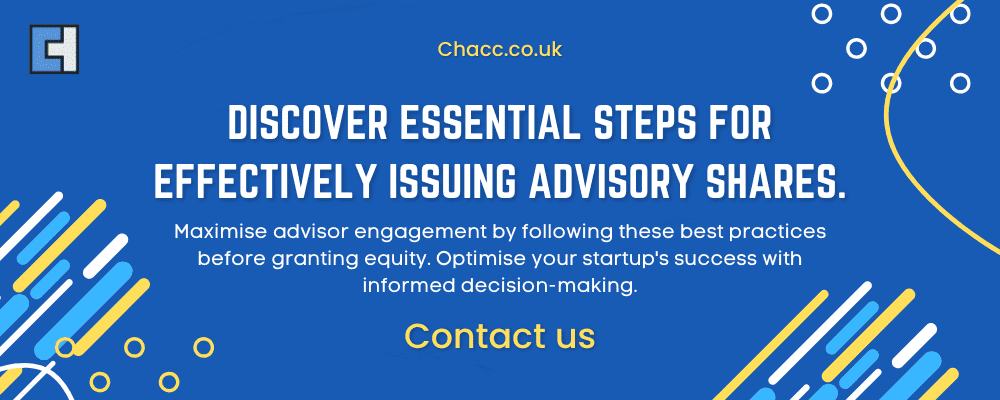Advisory shares represent a form of equity compensation offered to company advisors instead of, or in addition to, a traditional professional fee. These shares are akin to employee stock options and are commonly granted to key advisors during the initial phases of startups.
Securing the involvement of subject matter experts willing to contribute to a company’s success holds significant value, especially for startups in their early stages, ranging from pre-seed to series A and beyond. While financial resources might be limited, the insights and guidance provided by experienced advisors are immeasurable. Our suggestion? Recognise their contributions with a portion of company ownership!
Encouragingly, many seasoned company advisors actually prefer receiving equity rather than immediate cash compensation. They are well-acquainted with the financial constraints startups often face and understand the potential long-term benefits of being early participants in the company’s ownership structure.
Explore Your Funding Options: From Series Funding to Crowdfunding
What Is A Startup Advisor
A startup advisor is an individual who leverages their prior business or industry expertise to support fledgling startups. Their contributions encompass various aspects, such as aiding in product research and development, providing mentorship, establishing valuable networking connections, and offering a new perspective.
For startups aiming to address deficiencies, these advisors are a valuable inclusion. They frequently possess qualities that complement the skills of the founders. This might involve an extensive understanding of a particular industry or a network of contacts. More sizable companies might sometimes assemble a startup advisory board comprising multiple advisors, each contributing essential talents and skills.
The Three Types Of Startup Advisors
In the realm of advisory roles, startups commonly engage with three distinct types: Board Advisors, Technology Advisors, and General Advisors. Each advisor category fulfils a unique function and may necessitate a varying proportion of equity compensation.
Board Advisors
Board Advisors typically consist of seasoned former founders or industry experts. They contribute insights into the company’s overarching strategic trajectory and often secure a position on the board of directors. Their involvement shapes the company’s strategic decisions and exerts a substantial influence. Given their elevated expertise and impact, these advisors may receive a share of equity ranging from 1% to 2% or even more, surpassing the allotment for other advisor types.
Technology Advisors
Technology Advisors play a pivotal role by leveraging their extensive technology sector knowledge. They may introduce best practices in technology and design system architectures and engage directly in development tasks. Their contributions mould the company’s long-term technological vision and roadmap. In recognition of technology’s critical role in today’s business landscape, these advisors might also be granted equity ranging from 1% to 2%. Nevertheless, an alternative arrangement could involve monetary compensation or a blend of cash and equity. Sometimes, Tech Accountants require working with Technology Advisors when making claims for things such as R&D Tax Reliefs, etc; as these can get quite costly, firms might prefer offering advisory shares in return for the advisor’s time.
General Advisors
General Advisors share similarities with Board Advisors but do not hold board positions. While their impact on the company’s strategic direction might be less pronounced, their insights and expertise remain invaluable. For instance, an ex-Chief Marketing Officer from a distinct industry could serve as a highly beneficial General Advisor. Equity compensation for these advisors generally falls from 0.5% to 1%.
Some Tips On Finding Startup Advisors
Here are some guidelines for identifying startup advisors:
Target the Right Candidates
Seek individuals who aren’t in a position to be investors or full-time employees but are enthusiastic about your company’s success, which aligns with their benefit.
Leverage Your Network
Begin your search within your existing network. Convert trusted mentors into formal advisors or ask your investors for referrals and connections.
Utilise Specialized Platforms
Platforms like Chacc can offer expert advice tailored to your needs, connecting you with growth experts from reputable companies.
Avoid Superficial Additions
Refrain from adding prominent names to your advisory board solely for appearances. Ensure prospective advisors are accessible and genuinely engaged in your company’s progress.
Thorough Evaluation
Potential advisors as you would a staff member. This includes interviews, reference checks, and confirming their lack of conflicts of interest.
Continuous Assessment
Regularly review your advisors’ effectiveness, possibly every six months, and replace members as your business requirements evolve.
Ultimately, prioritise advisors who contribute meaningfully and recognise when it’s appropriate for them to step down.
Who can Be an Advisor?
In an ideal scenario, individuals associated with equity in your company would fall into the categories of investors or employees. However, there are instances where this straightforward classification doesn’t fit for various reasons:
Financial Constraints
Not everyone possesses the financial capacity to invest significantly in a startup. For some, the concept of being an investor might be financially unfeasible.
Time Limitations
Time is a precious commodity; some individuals might need more availability to commit as full-fledged employees. Their schedules might align differently from the demands of a typical work arrangement.
Niche Expertise
Certain individuals bring a specialised skill set or industry connections that could substantially benefit your startup. Their contribution might be driven by their unique strengths in a particular area rather than fitting the conventional employee mould.
Hybrid Involvement
While an employee-employer relationship might not be the right fit, you desire their involvement to extend beyond a contractual engagement. You aim to harness their insights, guidance, or network, which could prove invaluable for your company’s growth.
Criteria for Advisor Selection
Choosing the right advisors demands careful consideration, aligned with your startup’s needs and the advisor’s potential contributions:
Expertise
Advisors should possess specialised skills or knowledge that align with your startup’s goals, whether it’s in a specific industry, technology, marketing, or other relevant domains.
Reputation and Networks
Individuals with a substantial network of industry contacts can facilitate crucial introductions, partnerships, and collaborations that propel your startup forward.
Track Record
Advisors with a history of successful startups or business ventures bring valuable experience and insights, enhancing your decision-making processes.
Alignment of Interests
Ensure the advisor’s motivations align with your startup’s vision and goals, fostering a cooperative and productive relationship.
Commitment
Seek advisors who are genuinely interested in contributing beyond financial compensation, demonstrating a commitment to your startup’s success.
Balancing Advisory Roles
By selecting advisors thoughtfully, startups can find a harmonious balance between financial capacity, time availability, specialised expertise, and meaningful engagement. These advisors become instrumental in steering your startup’s growth journey, adding depth to your team beyond traditional investor or employee roles.
Why Advisors Should Be Compensated
High-calibre advisors are busy people with many options for spending their time. If they don’t put a premium on their time, then they probably aren’t a great advisor to begin with.
To make it worth their while to spend time helping you and reaching into their Rolodex, you should compensate them accordingly. Even if they offer to be an advisor for no compensation, they are more likely to help if they have skin in the game. Equity compensation, in particular, creates alignment between their actions and the company’s success. Since most startups are cash-strapped, equity-based compensation is also the most practical.
Advisor Compensation: Cash Or Equity
Startup advisers are normally paid for their work, unlike startup mentors, who typically play a more casual, unpaid role. This raises the question: Should startup advisors be compensated with cash or stock in the company?
Advisors typically get paid with stock. This type of payment is preferred for a number of reasons:
- Startups that are still developing (or even in the concept stage) often need more money to pay employees. Instead of spending money, offering startup advisor equity is typically a wise financial decision.
- In exchange for sizable equity ownership in the company, workers at startups frequently accept lesser pay. In the event of a successful exit, the stake may be sold. Consequently, it makes it reasonable to pay consultants in a similar way. In this way, their compensation is determined by the value they add to the company and is based on how well the firm does.
- Unlike employees or external consultants who are paid in cash, advisors typically don’t have predetermined deliverables that they are obligated to produce. When a substitute, they provide advice and insight when required. This position is more in line with equity remuneration.
Advisory shares, which are typically distributed as common stock (much like the stock options that workers receive), are the typical form of payment for advisors. Instead of actual shares, these are options to purchase shares, which can ease any tax worries. In order to promote long-term advisor relationships, these shares are often paid out over time and vest according to a schedule.
Although advisor shares often vest sooner than employee shares, this is not always true. That’s because startups may work with various advisors as they develop and flourish. Most of the value many advisors contribute to a partnership is delivered early on.
What Are Advisory Shares
Advisor shares, or advisory shares, represent shares of stock granted to advisors in a startup as compensation. By providing advisor shares, the startup offers these advisors a stake, or ownership interest, in the company.
Typically, startups compensate advisors through a combination of salary, equity, or a combination of both. In the context of this discussion, when we mention ‘equity,’ we are referring to either actual shares of stock or share options.
Similar to how you wouldn’t pay an individual their entire year’s worth of salary upfront in cash if you award an advisor with shares or share options, there should always be a vesting schedule in place. Vesting ensures that if an advisor departs or is let go prematurely, they wait to gain access to all their shares or options. Regarding shares, the startup retains the right to repurchase the unvested shares. With share options, the advisor would only receive the vested options up to that point.
The concept of vesting is what sets advisor shares apart from investor shares. Investors inject capital into the startup and instantly receive their full allotment of shares without vesting requirements.

What Are Advisory Shares Vs Equity Shares
Defining Advisory Shares and Equity Shares
In the world of startups, equity distribution is crucial for luring in and keeping on board important personnel who contribute to the expansion of the business. In this equity distribution scenario, it is important to understand what are advisory shares vs equity shares.
Advisory Share
Advisory shares refer to a portion of a startup’s ownership that is granted to individuals who provide strategic guidance, industry expertise, and mentorship to the company. These individuals, known as advisors, typically do not have operational roles within the startup but contribute by sharing their knowledge and insights.
Equity Shares
Equity shares, on the other hand, represent ownership stakes in the company that are granted to founders, employees, investors, and other key stakeholders who actively participate in the company’s operations and growth.
We’d discuss differences between advisory and equity shares based on several factors and indicators. The table below summarises the differences between both share types:
| Factor | Advisory Shares | Equity Shares |
| Purpose and Function | Compensation for advisors’ contributions, lacking voting rights or profit ownership. | Voting rights, stake in profits and ownership based on terms. |
| Ownership Rights | Variable based on agreement, usually no voting rights or profit stake. | Voting rights, stake in profits/ownership based on terms. |
| Voting Rights and Decision-Making | Limited or no voting rights focus on non-financial compensation. | Full voting rights for shareholders, power in company decisions. |
| Dividend Entitlements | May include dividend rights based on advisory agreement. | Entitled to dividends if declared by the company. |
| Vesting and Exercising | Advisory shares often vest over time based on milestones or performance. | Standard equity shares usually have no vesting or instant ownership. |
| Transferability and Sales Restrictions | Restricted transferability is outlined in the agreements. | Generally more transferable with fewer restrictions. |
| Legal and Regulatory Considerations | Compliance with securities laws, tax regulations, and advisory-specific governance. | Compliance with securities, disclosure, and shareholder protection laws. |
How Much Equity Should You Give Your Advisor
Typically, equity allocation to advisors falls between 0.25% to 5%. However, the precise percentage is contingent on several factors, such as the advisor’s impact on the company’s growth, their expertise, and your willingness to offer equity.
For instance, an advisor participating in monthly meetings during the pre-funding stages might be granted equity between 0.25% and 0.5%.
Conversely, an advisor possessing an extensive network of potential future customers could receive a more substantial portion.
As the company undergoes its initial seed funding, an advisor’s equity stake could experience dilution down to 0.5%. During this phase, the advisor might transition from regular meeting attendance to an on-call role.
Further dilution could reduce the advisor’s equity to 0.25% or lower in subsequent funding rounds.
These percentages progressively decrease throughout the company’s lifespan. Although 0.25% may appear modest, its value can be significant based on the business’s valuation. The small slice of equity could translate into substantial worth depending on the company’s overall value.
Best Practices Before Issuing Advisory Shares
Communication and Documentation are crucial in issuing advisory shares to ensure transparency, clarity, and a mutual understanding between the company and the advisors. Here’s why they are important:
Transparency
It is important to clearly state the terms and conditions of how advisory shares work. Effective communication will ensure that advisors fully understand the provisions associated with the advisory shares they are receiving.
Expectations
Clearly communicating the expectations, responsibilities, and scope of advisory services helps advisors understand their role in contributing to the company’s success. This clarity ensures that both parties have a shared understanding of what is expected from each other.
Vesting Schedule
Suppose advisory shares are subject to a vesting schedule. In that case, it is crucial to communicate the specific vesting terms, including the vesting period, milestones, or performance targets needed for the shares to vest fully. This clarity helps advisors track their progress and understand the timeline for the potential ownership of the shares.
Restrictions and Transferability
If there are any restrictions on the transfer or sale of advisory shares, such as lock-up periods or rights of first refusal, these should be clearly communicated. Advisors need to understand any limitations on their ability to transfer or monetise their equity in the company.
Using the Right Tools
You should look at using platforms like Xero, Quickbooks, Carta, or Vestd. The tools make the process of managing and documenting the issuance of advisory shares much more efficient. You should also look at hiring expert Xero Accountants or similar to help with the setup and use of such tools.

Factors That Affect Advisor Shares
Various factors affect advisor shares and the whole compensation functionality are discussed as follows:
Advisor Role and Compensation
The distribution of advisor shares hinges on several factors, with the nature of the advisor’s role-playing a significant role. General Advisors typically receive a lower equity allocation than Board or Technology Advisors. This could be attributed to the distinct obligations of Board Advisor positions, emphasising legal and corporate responsibilities.
In contrast, Technology Advisors often contribute more days yearly, indicating a more substantial involvement. Moreover, General Advisors might be selected for their image-enhancing impact on presentations rather than active contributions.
Startup Valuation and Equity Allocation
The startup’s valuation directly impacts the equity portion allocated to advisors who receive equity as compensation. Generally, as valuation increases, the percentage of equity an advisor can expect to receive diminishes. Interestingly, the median equity allocation remains consistent across various valuation ranges at 1%. This equilibrium suggests that 1% is a prevalent benchmark for advisor equity allocation regardless of valuation.
Work Engagement and Equity Compensation
Advisors who exclusively receive equity compensation, especially those dedicating over two days per month, are awarded more substantial equity than their less-engaged counterparts. Limited engagement might indicate an advisor’s symbolic role, while heightened involvement reflects a genuine commitment warranting equitable compensation.
Vesting Periods and Duration
Vesting schedules are standard for advisor equity grants, usually spanning 1-2 years, often with monthly vesting. While founder and employee vesting periods tend to be more extended, advisors’ vesting is comparatively shorter. The necessity of a vesting cliff hinges on the advisor’s existing contributions and value to the startup. In cases of longstanding collaboration, cliffs might be deemed unnecessary.
Exercise of Equity
Vested options typically require exercise within three months post-termination to prevent expiration. This is crucial for “incentive stock options,” which are distinct from “non-qualified stock options” typically granted to advisors. Understanding the exercise dynamics and tax implications is vital for advisors and startups.
Tax Implications and Expert Advice
Taxation varies between shares and options. Shares awarded in exchange for services often incur income tax, while options trigger tax liabilities upon exercise. Given the intricacies of taxation, obtaining expert tax and accounting services for guidance before entering advisor agreements is strongly recommended.
From NI Basics to Expat Taxes: Simplifying UK Tax Rules
Additional Provisions and Legal Considerations
Advisors should commit to assigning all intellectual property and information acquired during their engagement. Confidentiality obligations and adherence to company policies are also vital. The arrangement must include a no-conflict provision and specific company policy adherence.
Termination and Continuous Engagement
Termination rights for both parties and automatic termination due to prolonged inactivity are customary clauses. Ensuring continuous communication and engagement is crucial to maintaining a productive advisor relationship.
The intricacies of advisory share allocation span various dimensions, from roles to valuation, engagement, vesting, exercise, taxation, legalities, and more. Mastering these facets empowers startups to construct equitable, legally sound, and mutually beneficial advisor agreements.
How Is A Startup Advisor Different From A Mentor Or A Consultant
Advisors typically only get together occasionally as a group and lack a board of directors’ legal and fiduciary obligations.
Advisors
- Tend to consult one-on-one with founders and executives as needed
- Sign agreements with startups specifying their roles
- Typically, they get compensated with equity (more on that later)
Mentors
Mentors are unpaid and act in an informal capacity
Consultants
Consultants can play a similar role as advisors but most often are hired to perform one or more specific tasks or projects and are paid in cash.
Frequently Asked Questions
What Is the Benefit of Advisory Shares?
Advisory shares offer a key advantage, enabling companies to reward external advisors or consultants for their non-financial contributions. These shares serve as a means to motivate advisors to actively lend their expertise, industry insights, and networks to foster the company’s growth and achievement.
How Long Do Advisory Shares Last?
The duration of advisory shares hinges on vesting schedules or exit events as stipulated in the Advisory Agreements or relevant regulations.
How Many Shares Does an Advisor Get?
Negotiation between the company and the advisor determines the number of shares granted to an advisor. There is no universal standard for the equity percentage allocated to advisors.
Do Advisory Shares Affect Valuation?
Indeed, advisory and regular shares impact a company’s overall valuation. Each share represents a slice of ownership or a form of financial compensation that directly or indirectly influences the company’s valuation.
Do Advisory Shares Get Diluted?
Like all stock or share options, advisory shares undergo dilution. The issuance of new shares diminishes the value of existing shares, reducing the stake held by current shareholders.
Can You Sell Advisory Shares?
No, advisory shares cannot be sold or transferred. They are conferred by companies as rewards to experts and differ from publicly traded stock options that retail investors can acquire.
Are Advisory Shares The Same As Equity?
No, advisory shares and equity are not the same. Advisory shares represent a specific type of equity compensation given to advisors for their contributions and guidance. While both advisory shares and regular equity shares involve ownership in the company, advisory shares often come with specific terms, vesting schedules, and limitations on transferability. Regular equity shares are more commonly issued to investors and employees, and they typically carry voting rights and a share in the company’s profits.
Does the Location of the Advisor Matter?
The location of the advisor, such as an Accountant in London, a Software Developer in Budapest, or a Legal Specialist in New York, matters. This is because the legal and tax implications can be different based on the location of the advisor.
Conclusion
Advisory shares, which provide a special form of pay, are crucial in bridging the gap between startups and outside advisers. These shares are an expression of appreciation to advisers for their priceless non-financial contributions, such as business knowledge, contacts, and networking. Advisory shares act as a strong motivator for active involvement by connecting advisers’ interests with the success of the organisation.
The vesting schedules and exit clauses included in advisory agreements determine how long advisory shares will last, encouraging responsibility and commitment. The distribution of shares to advisers is a nebulous structure that can change depending on discussions between the company and the advisors and is adapted to represent the advisor’s contributions and worth.
Importantly, advisory shares affect a company’s valuation by adding to the total ownership structure and impacting its value. Advisory shares have the potential to dilute current shareholders’ interests when new shares are issued, just like any other equity.
It’s crucial to keep in mind that advisory shares are distinct from publicly traded options in that they cannot be transferred or sold, underscoring their special status as a sign of appreciation. In essence, advisory shares are a symbol of the cooperative character of business, where knowledge is recognised with a piece of ownership, fostering a mutually beneficial partnership that drives firms to success.









































































